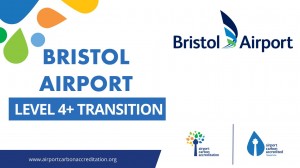Bristol Airport has become the first in the UK outside London to achieve a major independent industry accreditation in recognition of its efforts to become net zero in less than seven years’ time.
The airport has gained a ‘Level 4+ Transition’ level in the international carbon accreditation scheme run by the Airports Council International (ACI).
It comes as the airport prepares to handle 390,000 passengers between tomorrow and 2 January – its busiest-ever festive period.
The only global carbon management certification programme for airports, it ranks them on their progress in cutting carbon.
Level 4+ Transition is the second-highest possible and reflects that an airport has a long-term carbon management strategy for absolute emissions reductions.
This includes actively driving third parties towards delivering emissions reductions as well as the residual carbon emissions over which it has control, and that these are being offset using internationally recognised offsets.
Bristol Airport, which is currently being expanded to handle 12m passengers a year, declared its intention in 2021 to be one of the UK’s first airports to achieve net zero by 2030 – a statement described by Bristol Green Party councillors as “utter nonsense and a cynical form of greenwashing”.
They and other critics claim that because airports handle current aircraft that use standard aviation fuel they cannot become net zero.
Commercial aviation is estimated to be responsible for about 2%-3% of global carbon emissions.
Bristol Airport bosses claim by working with its airline operators and other contractors such as transport operators, baggage handling firms and caterers to embrace more sustainable methods, they are tackling this head-on.
The ‘Level 4+’ status – which is also held by Heathrow, Gatwick and London City – recognises this.
Bristol Airport reduced CO2 per passenger from its direct emissions by 61% from 2014 to 2022.
This has been achieved through measures including greater energy efficiency in buildings, the roll-out of electric vehicles, and increasing on-site renewable energy generation.
The airport recently introduced a new interim target of cutting direct emissions by 73% by 2027, relative to 2019 levels.
To achieve this it will need to remove all gas heating and replace it with air source heat pumps, while also converting more diesel vehicles to electric and changing all runway lighting to LED.
While non-direct emissions (known as scope 3) are a larger proportion of the airport’s emissions – and include flights and surface access – the airport said it was working with aerospace companies and others in the region to accelerate the delivery of zero-emission, hydrogen-powered flight by 2035.
The airport also continues to make £250,000 available each year through its Aviation Carbon Transition (ACT) programme to support research and innovation into cutting scope 3 emissions.
Airport planning and sustainability director Clare Hennessey said: “Reaching Level 4+ is an important and independent recognition of our progress getting to net zero carbon operations by 2030.
“The accreditation comes just as we’ve launched our new sustainability strategy, which sets out clear goals and targets for the next five years.
“Our strategy sets a benchmark for all to see and to which we will report our progress.”


















